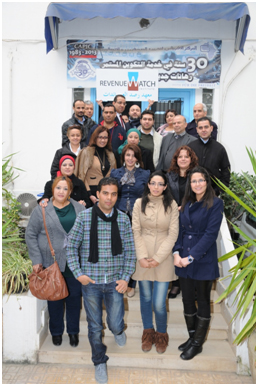
Tunisian Journalists Learn to Extract the Facts
The Tunisian revolution of 2011 brought about an unprecedented boost for freedom of speech in the North African country. More than ever, the media gained significant leeway to fulfil its watchdog role; more than ever, journalists are able to publicize any potential malfeasance by companies or breaches of duty or public trust on the part of the government.

Photo courtesy of the African Center for Training of Journalists and Communicators
Prior to 2011, the Tunisian media suffered for many decades under a dictatorial regime, the debilitating censorship of which meant that investigative skills amongst the fourth estate ran to ruin.
A recent Revenue Watch Institute – Natural Resource Charter (RWI-NRC) media assessment found that news of the extractives sector has been notoriously under-reported in Tunisia, due mainly to the opacity surrounding the sector and the consequent dearth of information and scarcity of media outlets or journalists specialized in it. The assessment revealed that what little coverage there had been was of a poor quality.
An active, knowledgeable press plays a critical role in helping inform and engage the public, citizen groups and legislators, who can then hold government and companies accountable. To report fairly, accurately and comprehensively on extractive industries governance issues (and the Extractive Industries Transparency Initiative [EITI], should Tunisia become a candidate country), journalists need a sound knowledge of the sector and the ability to analyze and report on its complexities.
It is within this context that RWI-NRC, with support from the UK government, held its first Tunisia media training in February. It was the first of a three-session cycle targeting journalists from the country’s main print and broadcast outlets. The training’s objective was to build the journalists’ capacity in covering extractives and to introduce them to relevant governance issues, including the EITI.
The workshop included many journalists from the southern phosphate-producing regions as well as those from the main media outlets, notably national news agency TAP.
The workshop provided both technical information about the sector, through presentations given by Tunisian energy and mines experts and government officials, as well as journalistic training on writing about extractives. In addition, RWI-NRC’s Tunisia program manager provided the journalists with insight into the extractives value chain and international norms, namely EITI.
In the course of the training, discussions revealed a glaring rift between journalists on one side, and the experts and government officials from the other. The experts stated that they have given information to journalists who then misused it or misrepresented it. The journalists protested that there is lack of transparency and that the responsibility to provide accurate and simple information is that of the experts and the government. However, as the workshop progressed, the rift seemed to narrow and journalists were more open to receiving and objectively questioning government information, while government representative grew more comfortable speaking with members of the media.
Participants received a number of useful documents about the sector nationally and internationally, as well as a list of useful sources. Participating journalists exhibited a high level of interest and motivation to delve into the sector. To date, a large percentage of them have written articles for their respective outlets tackling the issue. Future workshops will evaluate these new clips and formulate constructive criticism indicating how approaches might be improved in the future. Key media outlets, such as TAP and the national television network, expressed interest in receiving further personalized training for their staff.
With newfound press freedom comes the opportunity to become better informed, and members of the Tunisian media are ready and willing to learn more about an industry critical to the country’s future.
Authors

Hanen Keskes
Middle East and North Africa Senior Officer
